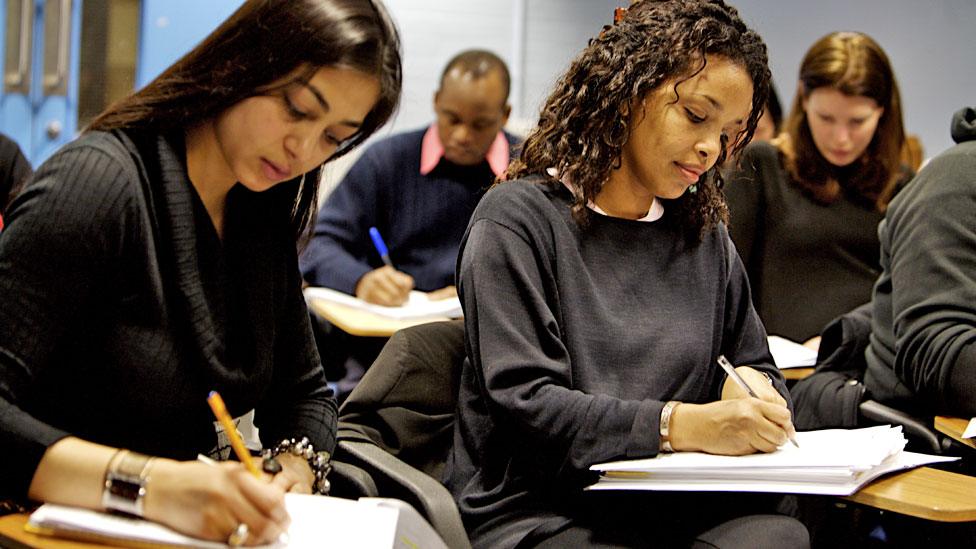Uni admissions could scrap use of predicted grades
- Published
- comments

A review setting out options for a radical overhaul of university admissions in England has been launched by the higher education watchdog.
The Office for Students has outlined an entry system which would scrap the use of predicted A-level grades.
Instead, applications would be delayed until students had their exam results.
Sir Michael Barber, chairman of the watchdog, said there was "widespread recognition" that parts of the admissions system were "not working".
In a separate report, the Higher Education Policy Institute says a fairer system would be to remove tuition fees for the first year for students whose parents had not gone to university.
The Office for Students' three-month review of how universities allocate places follows concerns about the fairness of the current system which uses predicted exam grades, references and personal statements.
The watchdog points out that in 75% of cases, pupils did not make the grades predicted by schools.
There have already been warnings from education ministers to reduce "unconditional offers", when universities recruit students with offers of places regardless of exam grades.
There has been concern about a lack of transparency over how "contextual" offers operate, where a disadvantaged candidate might be offered a place with lower grades.
And the watchdog also highlighted the discrepancy between the required grades advertised by universities and often much lower grades which were really needed to get places.
There have been warnings that "personal statements" - where students write about their own interests in a course - can be skewed towards those who get the most help from parents or teachers.
Sir Michael said the admissions process "may be especially unfair on students from disadvantaged backgrounds".
The watchdog has set out three options for reform:
Universities would not make offers until pupils had received their A-level results. But applications could be made in advance, as at present.
Applications would not be made until students had their A-level results. Pupils could have visited universities and registered an interest, but would not make a final choice on applying until they knew their exam grades.
Keep the current timetable broadly unchanged, but take more account of disadvantages facing some pupils, reconsider the use of personal statements and have more transparency over required grades
Delaying applications or offers until exam results are known would mean changing the current timetable - either taking A-levels or publishing results earlier or starting the university term later.
But it would also remove the need for information used as a proxy for exam results - such as predicted grades, personal statements and references.
Unconditional offers would also no longer be needed and students would not have to make multiple applications dependent on results they might or might not achieve.
Jo Grady, leader of the UCU lecturers' union, said there was "growing support for a shift to a fairer admissions system, where students apply to university after they have received their results".
"This review is the opportunity for us to finally move to a system where university offers are based on actual achievement rather than unreliable estimates of potential."
Claire Sosienski Smith, of the National Union of Students, said: "It has been clear that for some time the admissions system has not been working in the interest of students, so it is good to see that the OfS is taking action."
Universities UK is already running its own review of admissions, including examining the idea of applications coming after A-level results.
Chief executive Alistair Jarvis said the review "will make recommendations informed by what applicants, schools and universities think works well and where the main challenges lie in achieving greater fairness, transparency and aspiration-raising".
Clare Marchant, head of Ucas, which runs the admissions service, said they were already "exploring how the timetable of offer-making could be improved" and how to get more reliable grade predictions.
A different approach to creating more open access to university is proposed by the Higher Education Policy Institute.
To remove financial barriers for disadvantage, the think tank suggests anyone in the first generation of a family to go to university should not have to pay tuition fees in the first year, with the government picking up the cost.
The watchdog will publish its findings after the admissions review ends in May, but universities are independent bodies, and changes to admissions cannot be imposed on them.
But the review has the backing of Universities Minister Michelle Donelan who said it was vital that admissions processes were "transparent and work in students' best interests".
She said the review would be "instrumental in helping assess how the system can be improved".
- Published22 July 2019

- Published19 June 2018

- Published9 July 2019
